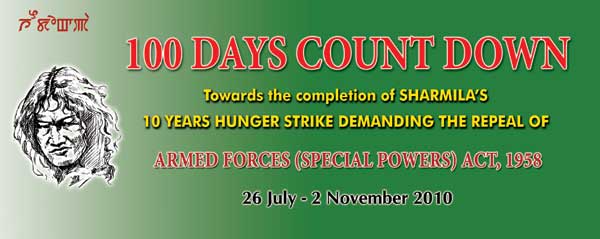
100 Days Countdown: Towards Completion of a Decade's
Hunger Strike By Irom Sharmila Chanu
25 July, 2010
On 2 November 2010, Ms. Irom Sharmila Chanu, a Manipuri poet, will complete ten years of hunger strike demanding the repeal of the Armed Forces (Special Powers) Act, 1958 (AFSPA). An extraordinary struggle of an extraordinary woman! Withstanding the test of time, the struggle exemplifies the triumph of human spirit over the unbridled power of the mighty Indian state.
Sharmila began her protest after the Malom massacre where 10 civilians were gunned down by the Armed Forces on 2 November 2000. AFSPA provides special powers to arrest, detain and even kill civilians on suspicion. The power to search and destroy properties on mere suspicion is granted to the Armed Forces of the Union in the 'disturbed areas' of the North East (and subsequently in Kashmir). Where ever AFSPA is in operation, enforced 'disappearances', extra-judicial killings, torture, rape and arbitrary detention have been routinely reported. In 1958 when the Union Home Minster introduced the law in the Parliament, he assured that the Act will be in operation for only 6 months. But it has dragged on for more than 52 years now!
The people of Manipur have done whatever is humanely possible to register their protest against AFSPA -- naked protest by mothers, self immolation by student leader, mass demonstration, petition to the Supreme Court, complaints to the United Nations etc. Same is the case with other peoples of the North East and the Jammu and Kashmir. Many well meaning civil society groups and political parties within India as well as human rights groups from abroad have consistently supported this demand.
AFSPA is untenable to universal human rights standards and international humanitarian laws. In 1997, the UN Human Rights Committee stated that by imposing AFSPA, the Government of India is in fact using emergency powers without resorting to the procedures laid down in the International Covenant of Civil and Political Rights. Again in 2007, the UN Committee on the Elimination of Racial Discrimination unequivocally urged the Government of India to repeal the Act within one year. During her visit to India in March 2009, the High Commissioner for Human Rights herself had urged the Government of India to repeal this Act. Demand for repeal of AFSPA was also raised in the European Parliament on 14 June 2010.
Government of India's own Committee to Review the Armed Forces Special Powers Act (set up by the Union Home Ministry and headed by Justice Jeevan Reddy, former Judge of the Supreme Court), the Administrative Reforms Commission, headed by present law minister V. Moily and the Working Group on Confidence-Building Measures in Jammu and Kashmir led by the present Vice President, Hamid Ansari, have all recommended repeal of AFSPA. Since the last winter session of the Parliament, an Armed Forces Special Powers Amendment Bill has been listed in the Parliament; but the text of the bill is not known. Even the Indian Army Chief has publicly stated on 19 July 2010 that he has no objection to the repeal of AFSPA.
Not withstanding the fact that the ills of AFSPA stands totally exposed today, it is still the law of the land. On the other hand, Sharmila who has become the icon of the protest against this draconian law is treated as a petty criminal, charged for attempting to commit suicide. Even though the May 18 Foundation of Korea has awarded her the prestigious Gwangju Prize for Human Rights in 2007, the Government of India continues her detention in isolation as a high security prisoner for a decade. Her struggle lies not only in defending the most basic and fundamental human rights of her people, but also in questioning the very foundations of Indian democracy which venerates Mahatma Gandhi and his principles of ahimsa or non-violence.
The Just Peace Foundation (JPF), in collaboration with the civil society in Manipur, is celebrating Sharmila's indomitable spirit, her audacity to hope in the midst of adversities, her unwavering stand for justice and her deep yearning for peace. In a simple function at the Manipur Press Club, we are launching a 100 Days Countdown as her unique, unprecedented and incredible marathon hunger strike completes a decade this coming November. A series of cultural programs, literary and artistic activities, public meetings, public rallies, and poster campaigns will mark the countdown which will culminate into a Festival of Hope, Justice and Peace from 2 to 6 November 2010.
JPF seeks your full participation to make this noble effort a grand success. JPF humbly request you to use this historic occasion to take whatever action possible to collectively muse over the age old concepts of Justice and Peace and to reach out to the ongoing struggles of all the oppressed peoples across the world.

